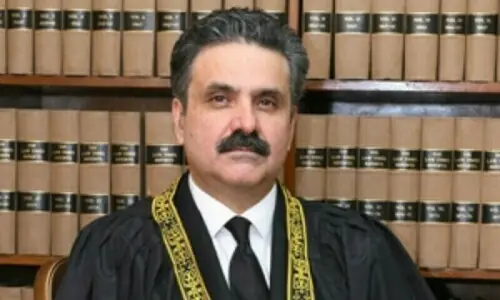
URDU alphabet has 54 letters, including 15 letters denoting aspirated sounds.
The statement is often considered contentious as the inclusion of 15 letters for aspirated sounds plus ‘hamza’ and ‘alif mamdooda’ in Urdu alphabet as letters is sometimes challenged (long ‘alif’ or ‘alif mamdooda’ occurs in the beginning in such words as aaj, aap, etc.).
But when Moulvi Abdul Haq began compiling Lughat-i-Kabeer, a comprehensive Urdu-Urdu dictionary, he had included these 15 letters and ‘alif mamdooda’ as distinct letters and created separate sections in the dictionary for words beginning with each of these letters. Later on some linguists, such as Masood Husain Khan, seconded the notion.
Similarly, the Urdu Dictionary Board decided to include all these letters in the alphabet and began compiling its 22-volume, the most comprehensive and authentic Urdu-Urdu dictionary ever published, with Urdu alphabet having 53 letters. The National Language Authority (NLA), now called the National Language Promotion Department (NLPD), considering the dictates of Urdu keyboard for computer and mobile phones, decided in 2010 that another letter (‘noon ghunna’, or character representing a nasalised vowel) was to be included in the list and NLA’s Jadeed Urdu Qaeda (Modern Urdu Primer) has 54 letters. This was reaffirmed by a seminar held at NLPD in 2022, attended by over 60 scholars from all over Pakistan. So as far as NLPD, a government of Pakistan organisation created as an authority on the Urdu language, is concerned Urdu has 54 letters. And that’s official.
But some obstinately disagree with a 54-letter Urdu alphabet and this is a hurdle in standardising spelling of certain Urdu words. This also affects as a whole Urdu orthography — the standardised system of writing a language according to spelling rules — or imla, as they call it in Urdu. In past, a large number of Urdu words had had variant spellings and in some cases an Urdu word could be spelt in three or even four different ways. However, with the arrival of printing press in the subcontinent began the much needed standardisation of Urdu orthography.
The fact is Urdu script is a modified form of Perso-Arabic script with addition of certain letters that represent some sounds that occur in Urdu/Hindi but do not exist in Persian and/or Arabic, such as ‘t’ sound (as in total) or ‘d’ sound (as in daddy).
Despite being much less incongruent than the English language spelling rules, the spelling system of Urdu has always been a bone of contention among the scholars and still is. Some scholars, such as Abdus Sattar Siddiqi, Ahsan Marehravi and Rasheed Hasan Khan, have played an all-important role in reforming and standardising Urdu orthography. But, with his remarkable work on Urdu orthography titled Urdu Imla, Rasheed Hasan Khan has become an inevitable reference in the history of Urdu orthography and its reformation efforts. In fact, no work on Urdu orthography can be considered authentic unless Rasheed Hasan Khan is discussed, no matter whether one agrees with him or not.
In his quest for spelling reforms Rasheed Hasan Khan favoured some spelling changes that were predominantly driven from spelling rules chalked out by Ahmad Bahmanyar and adopted for writing Persian in Iran. Khan, on the other hand, proposed some changes in the spelling of a large number of Arabic words used in Urdu and changed their spelling from Arabic origin to localised version. This infuriated many as it was clearly a deviation favouring Persian and opposing Arabic. Hafeez-ur-Rahman Vasif and Abu Muhammad Sahar penned entire books contesting Khan’s views.
A large number of articles, too, both in favour and against, have been written on Rasheed Hasan Khan’s orthographic concepts and reformatory ideas, many opposing him and others partially disagreeing with him, but none could have ignored Rasheed Hasan Khan, such is the impact of his work on Urdu orthography. But these pieces were scattered in many publication that appeared in India and across the border here in Pakistan.
So, Ibrahim Afsar, a scholar who holds a PhD on Rasheed Hasan Khan’s literary works, decided to collect articles on Urdu orthography written with reference to Rasheed Hasan Khan. The result is a book titled Urdu Imla: masael Aur Mabahis, Rasheed Hasan Khan Ke Haavale Se. But the book was published in India and we here in Pakistan have not had any access to Indian publication for many years. But this writer was obliged by Ather Farouqui, the secretary general of Anjuman Taraqqi-i-Urdu Hind, Delhi, who kindly mailed a copy of the book while visiting London.
The book includes 41 invaluable articles and some, written by bigwigs, truly objectively evaluate the issue. The book proves that the quest for a unified and standardized Urdu orthography is still going on.
Published in Dawn, October 16th, 2023

































